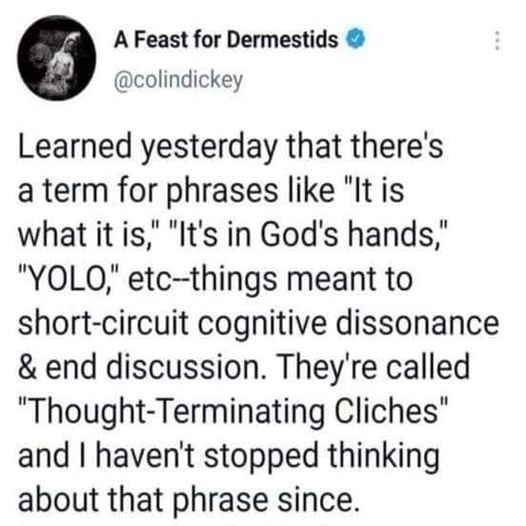this post was submitted on 16 May 2024
1143 points (98.1% liked)
People Twitter
5974 readers
1968 users here now
People tweeting stuff. We allow tweets from anyone.
RULES:
- Mark NSFW content.
- No doxxing people.
- Must be a pic of the tweet or similar. No direct links to the tweet.
- No bullying or international politcs
- Be excellent to each other.
- Provide an archived link to the tweet (or similar) being shown if it's a major figure or a politician.
founded 2 years ago
MODERATORS
you are viewing a single comment's thread
view the rest of the comments
view the rest of the comments

I don't think either of these are really thought terminating cliches inherently. The phrase is more for their usage as a rhetorical device to end arguments in certain ways. They become them when they are "used to intentionally dismiss dissent or justify fallacious logic" (https://en.wikipedia.org/wiki/Thought-terminating_clich%C3%A9)
Ending an argument often involves dismissing dissent. The end of an argument is also the end of thought on that argument. You’re just rewording the original term, that you’re arguing against.
It ends the argument it doesn't complete the argument.
You've essentially just stopped talking about the topic. No consensus has been arrived at. Possibly because one was not possible.
Yes, exactly what the screenshot says.
It's not productive to argue endlessly.
I disagree.
Source?
I was just joking about arguing endlessly, by carrying on an argument.
No you weren't.
Yeah they were.
No I wasnt
Source?
Source: them's be they, tho
*though
Your argument is in shambles.
The Wikipedia article has multiple conflicting definitions, including:
The problem is that the term is just BS, in part because the idea it was made to support is complete BS.
Defining 'Totalitarianism' was a cold war project of western academia, trying to come up with a way to say that the nazis and soviets were the same. They weren't though. Only far right US Nationalists still claim this. The term has very low analytical use, so once the pressure to create this propaganda evaporated with the end of the USSR the term quickly became defunct.
Thought terminating cliches was coined by a psychologist in ’61 trying to claim that 'totalist thought is characterized by thought terminating cliches.' To translate: the west has reasoned ideology, everyone else just spouts cliches.